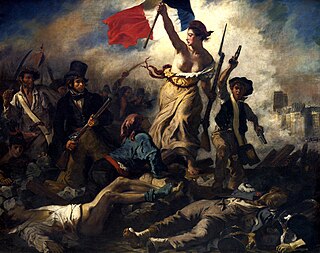Romanticism was a cultural movement.
Romanticism may also refer to:
Morphology, from the Greek and meaning "study of shape", may refer to:

Romanticism was an artistic and intellectual movement that originated in Europe towards the end of the 18th century. The purpose of the movement was to advocate for the importance of subjectivity, imagination, and appreciation of nature in society and culture in response to the Age of Enlightenment and the Industrial Revolution.

Romantic nationalism is the form of nationalism in which the state claims its political legitimacy as an organic consequence of the unity of those it governs. This includes such factors as language, race, ethnicity, culture, religion, and customs of the nation in its primal sense of those who were born within its culture. It can be applied to ethnic nationalism as well as civic nationalism. Romantic nationalism arose in reaction to dynastic or imperial hegemony, which assessed the legitimacy of the state from the top down, emanating from a monarch or other authority, which justified its existence. Such downward-radiating power might ultimately derive from a god or gods (see the divine right of kings and the Mandate of Heaven).
Stress may refer to:
Romantic may refer to:
Naturalism is a literary movement beginning in the late nineteenth century, similar to literary realism in its rejection of Romanticism, but distinct in its embrace of determinism, detachment, scientific objectivism, and social commentary. Literary naturalism emphasizes observation and the scientific method in the fictional portrayal of reality. Naturalism includes detachment, in which the author maintains an impersonal tone and disinterested point of view; determinism, which is defined as the opposite of free will, in which a character's fate has been decided, even predetermined, by impersonal forces of nature beyond human control; and a sense that the universe itself is indifferent to human life. The novel would be an experiment where the author could discover and analyze the forces, or scientific laws, that influenced behavior, and these included emotion, heredity, and environment. The movement largely traces to the theories of French author Émile Zola.
Romance may refer to:
Antiquity or Antiquities may refer to:

Romantic poetry is the poetry of the Romantic era, an artistic, literary, musical and intellectual movement that originated in Europe towards the end of the 18th century. It involved a reaction against prevailing Enlightenment ideas of the 18th century, and lasted approximately from 1800 to 1850. Romantic poets rebelled against the style of poetry from the eighteenth century which was based around epics, odes, satires, elegies, epistles and songs.
Athenaeum may refer to:
A journal, from the Old French journal, may refer to:

Dark Romanticism is a literary sub-genre of Romanticism, reflecting popular fascination with the irrational, the demonic and the grotesque. Often conflated with Gothic fiction, it has shadowed the euphoric Romantic movement ever since its 18th-century beginnings. Edgar Allan Poe is often celebrated as one of the supreme exponents of the tradition. Dark Romanticism focuses on human fallibility, self-destruction, judgement, punishment, as well as the psychological effects of guilt and sin.
Alcohol may refer to:
Jena is a German city, the second largest city in Thuringia, Germany.
Romance literature may refer to:
Gothic or Gothics may refer to:
NASSR or Nassr may refer to:

Romanticism was an intellectual movement that arose in the late eighteenth century and continued through the nineteenth century. The movement had roots in the arts, literature, and science. Largely conceived as a reaction towards the extreme rationalism of the Enlightenment, it championed expressing emotions through aesthetic and emphasizing the transcendent allure of the natural world.
Ravon or RAVON may refer to:
The philosophical ideas and thoughts of Edmund Burke, Thomas Carlyle, Johann Gottlieb Fichte, Friedrich Wilhelm Joseph Schelling, Søren Kierkegaard, Arthur Schopenhauer and Richard Wagner have been frequently described as Romantic.